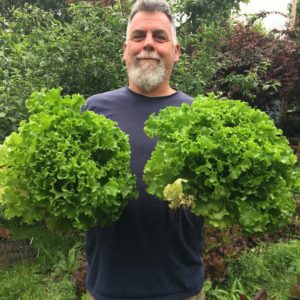The average distance Portland Farmers Market vendors travel to market each week is 50 miles. For some farmers, that number peaks at 300 miles, but Michael Barnett, who owns Red Truck Homestead, travels just over 5 miles to the King Farmers Market each week to sell a variety of fruits and vegetables.

Barnett and his wife Blynda started Red Truck Homestead in the backyard of their home in 2013. They moved to the property because Michael wanted to farm but Blynda didn’t want to live far outside the city. So, they compromised and built an urban farm in their backyard.
Red Truck Homestead has come a long way since then. They now operate their one-acre backyard farm, a 1/2 acre plot in the Cully neighborhood and earlier this year, thanks in part to the farm’s continued success, they purchased eight acres of land in Longview, Washington, to expand their operations further.
They sell a variety of produce at the King Farmers markets. In the summer they have an abundance of leafy greens, heirloom tomatoes and preserved goods. They also sell specialized crops like figs, greens, and berries to 8 local restaurants.
Barnett’s agriculture roots go back to his childhood. He grew up in Northeastern Maine and learned how to farm from his grandfather, an Italian urban farmer. He attended an environmental school in Maine, which further invested him in nature.
“We learned from life instead of books,” he said. “I love nature and being outside.”
By farming on a small scale, Barnett is able to focus on sustainable growing practices that he says go beyond the government’s definition of organic. He focuses heavily on soil health, and has many different compost mixes to make sure each crop has the necessary nutrients to thrive.
There are other benefits to farming in the city. Barnett says urban farming creates microclimates using hedgerows – large trees, shrubs and other foliage – to control climate, like blocking wind. As a result, the temperature on his property feels about five degrees warmer than the rest of the neighborhood.
But this does not necessarily mean it is easier to farm on a small scale.
“It is and it isn’t easier to farm on a small scale,” said Barnett. For example, he says turning compost is more tiring. Rather than using a tractor to turn his many compost piles, he has to do it all by hand, which takes hours instead of minutes. He also has to factor in the difference between city water and ground water. Most rural farms irrigate with groundwater or other natural sources of water, which carry beneficial microbes. But city water is treated, so he uses rain water collected on the farm whenever he can to offset the difference.
Like many farmers, Barnett also has a full time job. He works five to six hours per day on the farm before working a swing shift. His five-year plan is to “retire” and work on the farm full-time. Details are still uncertain but he hopes to teach others how to farm.
Barnett says the benefits of operating an urban farm far outweigh the challenges. The primary benefit is being close to the people he grows food for, and interacting with them at farmers markets.
“I love this city and the way they eat,” he said. “The healthy eating foodies and chefs and farmers markets in this town are our anchor.”
For more information about Red Truck Homestead follow them on Facebook or Instagram and be sure to pay them a visit at the King Farmers Market this season to try their produce for yourself.
